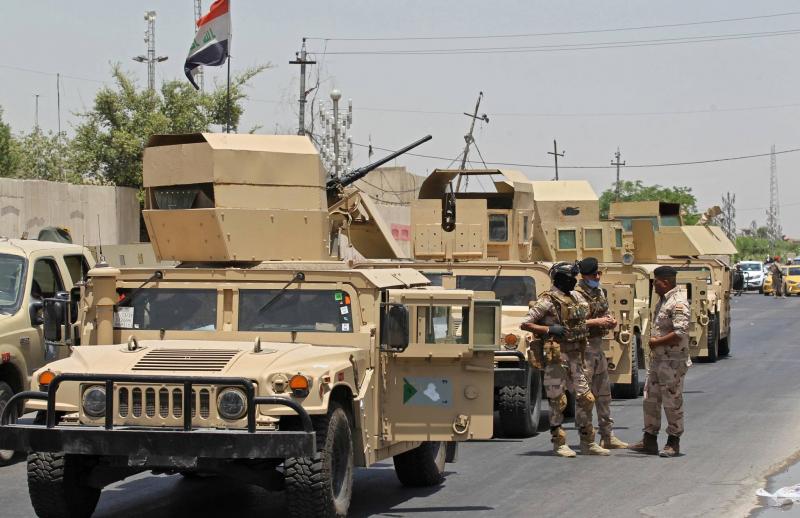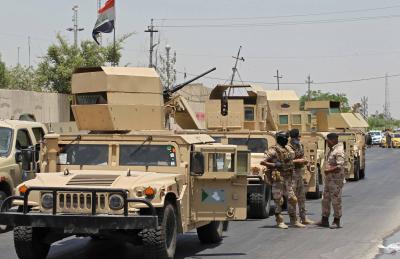The Iraqi Prime Minister stated that his country no longer requires US combat forces to fight ISIS, but the official timetable for the redeployment of troops will depend on the outcome of talks with US officials taking place this week. Mustafa al-Kadhimi mentioned that Iraq will continue to seek training and military intelligence assistance from the United States.
Al-Kadhimi's remarks came during an exclusive interview with the Associated Press ahead of his planned visit to Washington, where he is scheduled to meet with President Joe Biden on Monday in the fourth round of strategic talks between the two countries. He clarified that there is no need for "any foreign combat forces on Iraqi territory," without announcing a final deadline for the departure of US troops. He added that Iraqi security forces and army are capable of defending the country without support from the US-led coalition.
However, he stated that any timeline for withdrawal would depend on the needs of Iraqi forces, which demonstrated their capability to conduct independent operations against ISIS last year. Al-Kadhimi noted that "the war against ISIS and the readiness of our forces have imposed specific schedules (for the withdrawal of troops from Iraq) depending on the negotiations that we will conduct in Washington."
In April, the United States and Iraq agreed that the transition to a training and advisory mission means that the US combat role will end, but they have not reached a timeline for completing this transition. In a meeting scheduled for Monday at the White House, the two leaders are expected to set a timeline, likely by the end of this year.
The number of US troops in Iraq has stabilized at around 2,500 since late last year, when former President Donald Trump ordered a reduction from 3,000. The origins of the American training and advising mission for Iraqi forces can be traced back to former President Barack Obama’s decision in 2014 to send troops to Iraq in response to ISIS's seizure of large portions of western and northern Iraq and the collapse of Iraqi security forces, which appeared to threaten Baghdad. Obama had directed a complete withdrawal of US troops from Iraq in 2011, after eight years of American invasion.
In this regard, al-Kadhimi stated, "What we want from the US presence in Iraq is to support our forces with training and to enhance their capabilities, as well as security cooperation."
Al-Kadhimi's visit to Washington comes as the Iraqi Prime Minister's government faces setback after setback, seriously undermining public trust. Ongoing rocket attacks from some militias have shown the limited capacity of the state to prevent them. A series of devastating hospital fires amid rising COVID-19 cases has also resulted in dozens of deaths.
Meanwhile, less than three months remain until the early federal elections, aligning with al-Kadhimi’s promise when he took office. Nonetheless, the future of US-led coalition forces in Iraq tops the agenda in Washington. Iraq declared victory over ISIS in late 2017 following a devastating and bloody war.
The US and Iraq have held at least three rounds of strategic talks focusing on the military needs of Iraq in the ongoing fight against ISIS and formalizing a timeline for withdrawal. Four years after their battlefield defeat, ISIS fighters are still capable of carrying out attacks in the capital and moving in northern Iraq. Just last week, a suicide bomber killed 30 people in a crowded market in Baghdad, with ISIS claiming responsibility for the attack.
US and coalition officials insist that US forces no longer accompany Iraqi troops on ground missions, and that coalition assistance is limited to intelligence gathering, surveillance, and deploying advanced military technologies. Iraqi military officials emphasize that they still need this support in the future.
In this context, al-Kadhimi noted that "Iraq has a number of American weapons that need maintenance and training. We will ask the American side to continue supporting our forces and developing our capabilities."
The United Nations has formed an election monitoring mission to increase voter turnout. However, protesters have recently taken to the streets to express their anger over the rising killings of activists and prominent journalists. Even al-Kadhimi himself has acknowledged that some powers actively seek to undermine the elections. He pointed out that Iraq is currently in a sensitive situation and needs to calm the political climate to reach the elections.




